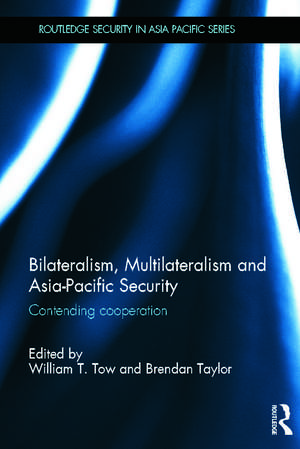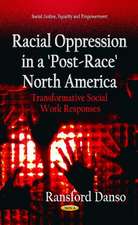Bilateralism, Multilateralism and Asia-Pacific Security: Contending Cooperation: Routledge Security in Asia Pacific Series
Editat de William Tow, Brendan Tayloren Limba Engleză Hardback – 19 mar 2013
Din seria Routledge Security in Asia Pacific Series
-
 Preț: 326.36 lei
Preț: 326.36 lei -
 Preț: 387.49 lei
Preț: 387.49 lei - 26%
 Preț: 821.87 lei
Preț: 821.87 lei -
 Preț: 390.37 lei
Preț: 390.37 lei -
 Preț: 411.85 lei
Preț: 411.85 lei -
 Preț: 466.29 lei
Preț: 466.29 lei - 18%
 Preț: 1167.71 lei
Preț: 1167.71 lei -
 Preț: 132.04 lei
Preț: 132.04 lei - 18%
 Preț: 1002.99 lei
Preț: 1002.99 lei -
 Preț: 261.75 lei
Preț: 261.75 lei -
 Preț: 476.60 lei
Preț: 476.60 lei -
 Preț: 485.32 lei
Preț: 485.32 lei - 12%
 Preț: 325.34 lei
Preț: 325.34 lei -
 Preț: 412.74 lei
Preț: 412.74 lei -
 Preț: 491.26 lei
Preț: 491.26 lei - 17%
 Preț: 271.61 lei
Preț: 271.61 lei - 18%
 Preț: 736.24 lei
Preț: 736.24 lei -
 Preț: 260.07 lei
Preț: 260.07 lei -
 Preț: 282.69 lei
Preț: 282.69 lei - 18%
 Preț: 1053.92 lei
Preț: 1053.92 lei -
 Preț: 484.47 lei
Preț: 484.47 lei -
 Preț: 467.44 lei
Preț: 467.44 lei -
 Preț: 463.58 lei
Preț: 463.58 lei -
 Preț: 471.25 lei
Preț: 471.25 lei - 18%
 Preț: 1227.03 lei
Preț: 1227.03 lei -
 Preț: 450.03 lei
Preț: 450.03 lei -
 Preț: 316.83 lei
Preț: 316.83 lei -
 Preț: 343.91 lei
Preț: 343.91 lei -
 Preț: 389.66 lei
Preț: 389.66 lei - 18%
 Preț: 1002.63 lei
Preț: 1002.63 lei - 43%
 Preț: 214.23 lei
Preț: 214.23 lei - 18%
 Preț: 1162.84 lei
Preț: 1162.84 lei - 18%
 Preț: 1060.52 lei
Preț: 1060.52 lei
Preț: 1165.73 lei
Preț vechi: 1421.63 lei
-18% Nou
Puncte Express: 1749
Preț estimativ în valută:
223.07€ • 230.13$ • 186.15£
223.07€ • 230.13$ • 186.15£
Carte tipărită la comandă
Livrare economică 27 martie-10 aprilie
Preluare comenzi: 021 569.72.76
Specificații
ISBN-13: 9780415625807
ISBN-10: 0415625807
Pagini: 240
Ilustrații: 1 b/w image, 2 tables and 1 line drawing
Dimensiuni: 156 x 234 x 14 mm
Greutate: 0.51 kg
Ediția:1
Editura: Taylor & Francis
Colecția Routledge
Seria Routledge Security in Asia Pacific Series
Locul publicării:Oxford, United Kingdom
ISBN-10: 0415625807
Pagini: 240
Ilustrații: 1 b/w image, 2 tables and 1 line drawing
Dimensiuni: 156 x 234 x 14 mm
Greutate: 0.51 kg
Ediția:1
Editura: Taylor & Francis
Colecția Routledge
Seria Routledge Security in Asia Pacific Series
Locul publicării:Oxford, United Kingdom
Public țintă
PostgraduateCuprins
Part 1: Setting the Context 1. Introduction 2. Conceptualising the Bilateral-multilateral Nexus Part 2: The Nexus and America’s Asian Alliances 3. Bridging Alliances and Asia-Pacific Multilateralism 4. Stretching the Japan–US Alliance 5. The US–Philippines Alliance: Moving Beyond Bilateralism 6. Thailand's Security Policy: Bilateralism or Multilateralism? Part 3: The Nexus and Asian Multilateralism 7. The Role of the Five Power Defence Arrangements in the Southeast Asian Security Architecture 8. Territorial and Maritime Jurisdiction Disputes in East Asia: Comparing Bilateral and Multilateral Approaches 9. The Bilateral–Multilateral Nexus in Asia's Defence Diplomacy Part 4: The Nexus and Asian Security Order 10. The Rise of China and the Transformation of Asia-Pacific Security Architecture 11. Alliances and Order in the "Asian Century" 12. Conceptualizing the Relationship between Bilateral and Multilateral Security Approaches in East Asia: A Great Power Regional Order Framework 13. Conclusion
Notă biografică
William Tow is Professor and Head of the Department of International Relations at the Australian National University.
Brendan Taylor is Associate Professor and Head of the Strategic and Defence Studies Centre at the Australian National University.
Brendan Taylor is Associate Professor and Head of the Strategic and Defence Studies Centre at the Australian National University.
Descriere
Many scholars of international relations in Asia regard bilateralism and multilateralism as alternative and mutually exclusive approaches to security co-operation in the region, arguing that eventually multilateral associations such as ASEAN will in time replace the system of bilateral alliances which were the predominant form of security co-operation in Cold War times and which continue as the primary means of the United States’ engagement with the region, for example the US alliances with Japan and South Korea. This book contends, on the other hand, that bilateralism and multilateralism are not mutually exclusive, and that bilateralism is likely to continue strong even as multilateralism strengthens.










